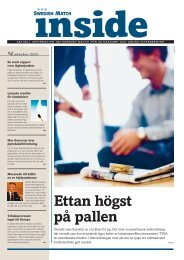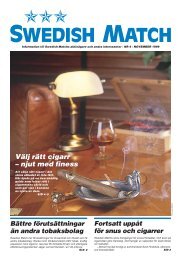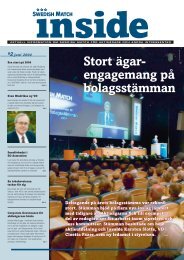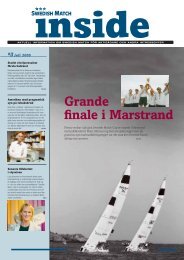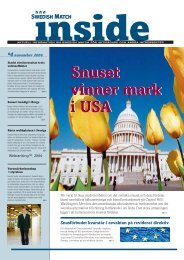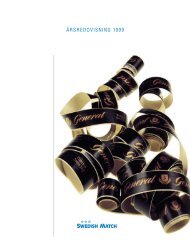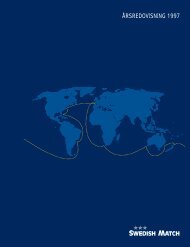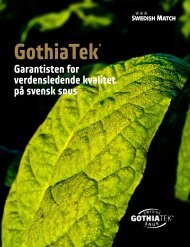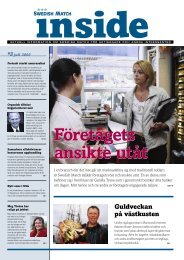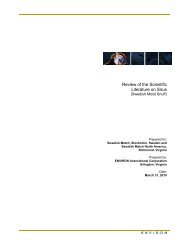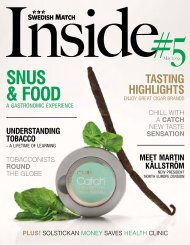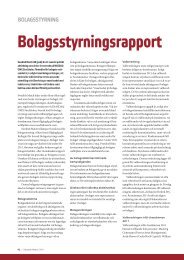You also want an ePaper? Increase the reach of your titles
YUMPU automatically turns print PDFs into web optimized ePapers that Google loves.
8 A MAGAZINE FOR SWEDISH MATCH’ S SHAREHOLDERS AND OTHER INTERESTED PARTIES NO 1 · FEBRUARY <strong>2000</strong><br />
ACQUISITION OF LEONARD DINGLER IN SOUTH AFRIKA<br />
South African tobacco company Leonard Dingler Ltd has been part of the <strong>Swedish</strong> <strong>Match</strong> Group since<br />
last autumn. The South Africa in which <strong>Swedish</strong> <strong>Match</strong> has invested is a country in a process of<br />
change – a South Africa characterized by hope and belief in the future, undeterred by the size of the<br />
obstacles and difficulties along the way. The acquisition has major strategic importance for <strong>Swedish</strong><br />
<strong>Match</strong>, which sees South Africa as the gateway to other markets in southern Africa.<br />
Profitable company with long tradition<br />
– is starting-point for expansion<br />
Managing director<br />
Mark Wraith is the<br />
great-grandson of the<br />
company’s founder<br />
Leonard Dingler.<br />
“Once we had decided<br />
to sell, <strong>Swedish</strong><br />
<strong>Match</strong> was the best<br />
option,” he says.<br />
“Once we had decided to<br />
sell the company, which<br />
has been in our family<br />
for a hundred years,<br />
<strong>Swedish</strong> <strong>Match</strong> was the<br />
best choice of purchaser.<br />
The two companies form<br />
an ideal match, since<br />
both have the same<br />
product orientation,” says<br />
Mark Wraith, managing<br />
director of South African<br />
tobacco company<br />
Leonard Dingler.<br />
Our first few months<br />
together have gone<br />
very well, with earnings<br />
continuing at a<br />
favorable level,” he adds.<br />
Leonard Dingler Ltd is located in the Boksburg<br />
industrial area on the outskirts of Johannesburg,<br />
a city with well over a million inhabitants.<br />
On the lawns outside the gates sit a<br />
number of job-seekers. It is unlikely that their<br />
perseverance will be rewarded, since few of<br />
Leonard Dingler’s employees leave their jobs<br />
voluntarily. Many of<br />
Leonard Dingler’s employees<br />
have been with<br />
the company for more<br />
than 20 years, and a<br />
few for more than 30<br />
years.<br />
A rich aroma of<br />
tobacco pervades the interior of the plant,<br />
where more than 300 employees carry on the<br />
company’s 100-year-old tradition.<br />
Since the company was founded in 1904,<br />
Leonard Dingler has been producing and selling<br />
pipe tobacco and snuff in South Africa and<br />
its neighboring countries. Today, the company<br />
has annual sales of approximately SAR 300 M,<br />
with good profitability.<br />
“South Africa is a large and interesting<br />
market for smokeless tobacco products and<br />
therefore fits in well with our strategy,” says<br />
Ingemar Olsson, head of the Overseas Division,<br />
of which Leonard Dingler is now part.<br />
South Africa is a large and stable tobacco<br />
market. The consumers are loyal to their<br />
brands and, despite the constantly increasing<br />
levies and taxes on tobacco and the increasingly<br />
hostile climate with which the tobacco<br />
industry as a whole has to contend, the total<br />
market is growing slightly every year. However,<br />
the increasing weight of anti-smoking<br />
opinion is a cause for concern. While the trend<br />
has not advanced as far in South Africa as in<br />
Europe, it is still likely<br />
that various types of<br />
restrictions will be imposed<br />
in the long term.<br />
Other causes of concern<br />
include the growing<br />
tax and excise<br />
duty on tobacco products.<br />
However, the inevitable consequence of<br />
such impositions – the increased incidence of<br />
cigarette smuggling – does not represent a threat<br />
for Leonard Dingler, since the company does<br />
not sell cigarettes.<br />
“Our greatest challenge at present is to<br />
increase our already large market share and<br />
develop new products. Other possibilities<br />
include expanding the market for our Boxer<br />
pipe tobacco by increasing our presence in<br />
more countries in Africa,” says Chad Limbert,<br />
the company sales manager.<br />
Both Chad and his colleague Ivan McQueen<br />
began their careers with Leonard Dingler as<br />
traveling sales representatives – Chad 10 years<br />
ago and Ivan 30 years ago. But sales methods<br />
have changed dramatically.<br />
“Today, our products are sold exclusively<br />
via distributors, and none of our sales personnel<br />
handle cash,” explains Chad. “We also make<br />
less and less use of vehicles carrying the company<br />
name. Just about everybody here is familiar<br />
with the Boxer and Taxi brand names, and<br />
tobacco is a highly prized target for thieves.”<br />
Boxer and Taxi<br />
– top-selling brands<br />
Leonard Dingler’s top-selling product is its<br />
Boxer brand pipe tobacco, which accounts<br />
for more than 70 percent of the company’s<br />
sales. Boxer is the clear market leader<br />
among pipe tobaccos in South Africa, with<br />
about 70 percent of the market.<br />
The snuff brand Taxi accounts<br />
for about 20 percent<br />
of sales. Taxi is available in<br />
three different flavors and is<br />
sold in small red, green or blue<br />
plastic cans, depending on the<br />
flavor.<br />
Leonard Dingler’s other<br />
products include 1904 pipe<br />
tobacco, Magnet snuff and<br />
Black&White pipe tobacco. The<br />
latter is exported to Namibia,<br />
where it is the market leader.



